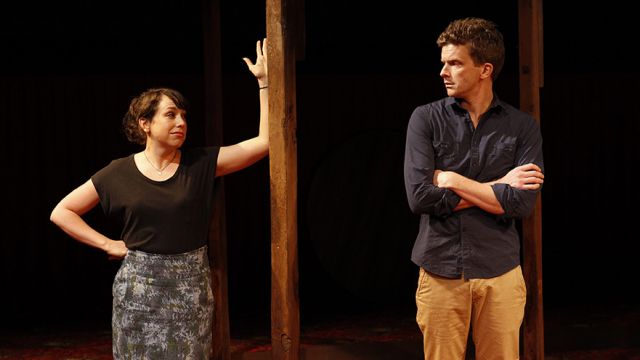Constellations
Some people live their lives within the safe confines of limited probability. Others embrace a universe of infinite possibilities; and it’s these people that playwright Nick Payne is talking to in his amazing play, Constellations. The words “what if?” are life blood to any writer, providing multiple scenarios from a single premise. Payne takes it further. What if “destiny” exists in quantum physics like string theory….and everything that ever was or ever will be co-exists in parallel universes with millions of variations of ourselves? It’s been done more simplistically in films like Sliding Doors and Groundhog Day but never with this degree of jaw dropping power.
Roland (Leon Ford) is a beekeeper, a somewhat hapless nerd, who meets the eclectic and garrulous Marianne (Alison Bell) , a quantum physicist with a huge appetite for life , at a barbecue…or does he? The chance meeting (though nothing in any universe is by chance) is repeated, like everything else in their lives until they come together, finally, because each forms a part of the other’s string theory. It’s basically a complex romantic comedy, and yet it’s also so much more…..it’s love, and death, and the whole damn universe played from every known point of view. And for myself, and the first night audience, it was exhilarating and very special theatre.
What could have seemed like a drama student masterclass (“okay guys, the same dialogue but with a different emotional P.O.V this time please”) becomes an incredibly intimate portrait of existence through love in the hands of two superb actors and a gifted director.
Leticia Caceres is totally in tune with the text and, more importantly, the emotional subtext. She gives her actors a clean base to work from and moves them sometimes only 10 degrees in any direction, if the “string” creates a scenario close to the original. At other times she hurls them across the space, just as she metaphorically hurls the audience to a new possibility which had not even been on the radar before. It’s masterful blocking – and that’s part of her technique, her craft, but it’s also wonderful storytelling, and that comes with talent alone, it can’t be learned.
Leon Ford is a writer, and so he must have salivated and thought Christmas had come when he read the script – for it is a gift to writers. He gives us a Roland of infinite possibilities….shy, angry, confused, lustful, guarded:- every emotion a human being can experience in multiple lives is part of his Roland. It’s a wonderful endearing and confronting, as well as confronted, performance, and Ford plays it with a growing knowledge of himself and the reality that he is part of something that is pre-determined, no matter how much he wants to change the outcome.
The amazing Alison Bell reminds us why she has a stash of acting awards at such a young age. Hers is the most monumental journey, and the hardest to accept as tone turns from comedy to tragedy. Life exists concurrently in all genres, and Marianne knows this but refuses to give in to inevitability as she grapples to take control of just one string, one variation of her life. I cried for, and with, her. Rachel Burke’s lighting was beautiful, but the only thing that jarred for me was the set, it had more random detail than was necessary, I thought.
When Brett Sheehy launched the MTC’s 2013 programme he promised us exceptional theatre. So far that promise has been kept. See Constellations if you possibly can. It is very special. See it a thousand times, you will always find a new “what if?”. The line between science and the esoteric is as blurred as time itself.
Coral Drouyn
Image: Alison Bell (Marianne) and Leon Ford (Roland). Photographer: Jeff Busby.
Subscribe to our E-Newsletter, buy our latest print edition or find a Performing Arts book at Book Nook.

